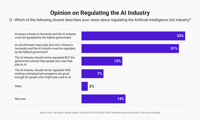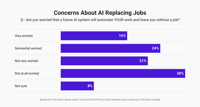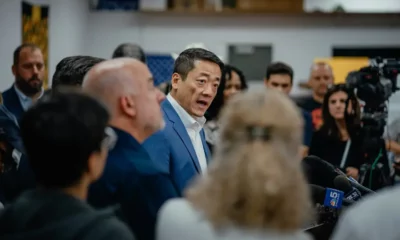(The Center Square) – Some 64% of registered voters want the government to regulate emergency artificial intelligence and 40% are concerned about losing their job to AI.
The Center Square Voters’ Voice Poll found that 33% of voters think Al poses a threat to humanity and the Al industry must be regulated by the federal government while 31% think Al will eliminate many jobs (but isn’t a threat to humanity) and the federal government must regulate the Al industry. Another 13% think the Al industry should not be regulated, but the government should help people who lose their jobs to Al.
Some 7% think the Al industry should not be regulated and existing unemployment programs are good enough for people who might lose a job to Al. Twice as many – 14% – said they weren’t sure how to deal with AI.

“Most people don’t work in AI, so they don’t see any harm in regulating the industry. Think of it this way – if you’re a normal person going to a normal job, you don’t lose anything by regulating AI. So if you’re at all worried about AI upending the economy or even harming people, then there’s only benefits to restricting AI,” said David Byler, head of research at Noble Predictive Insights. “AI boosters would disagree with this idea – they see regulating AI as choking off innovation and stalling progress. But it’s easy to see how an everyday person could see some upside in regulation and no real downside in their daily life.”
About 40% of voters are worried about losing their job to AI. About 14% of registered voters said they were “very worried” about losing their job to future AI automation. An additional 24% said they were “somewhat worried” while 21% reported being “not very worried” and 30% said they were “not at all worried.” Another 8% said they weren’t sure.

The poll comes as governments at the local, state, and federal levels craft approaches to dealing with powerful technology.
In 2024, at least 45 states, Puerto Rico, the Virgin Islands and Washington, D.C., introduced AI bills, and 31 states, Puerto Rico and the Virgin Islands adopted resolutions or enacted legislation, according to a National Conference of State Legislatures report.
Colorado recently passed AI legislation that requires developers and deployers of high-risk AI systems to use reasonable care to avoid algorithmic discrimination and requires disclosures to consumers. Florida lawmakers provided grants to school districts to implement AI to help students and teachers. Some states took a more basic approach. For example, Indiana created an AI task force.
The poll was conducted by Noble Predictive Insights from April 15-18, 2025, and surveyed registered voters nationally via an opt-in online panel and text-to-web cell phone messages. The sample included 2,527 respondents, comprised of 1,089 Republicans, 1,187 Democrats, and 251 True Independents, which Noble Predictive defines as independents who chose neither when asked if they lean toward one of the major parties. It is one of six national tracking polls in the U.S.
The margin of error was +/- 2.0%.





















































